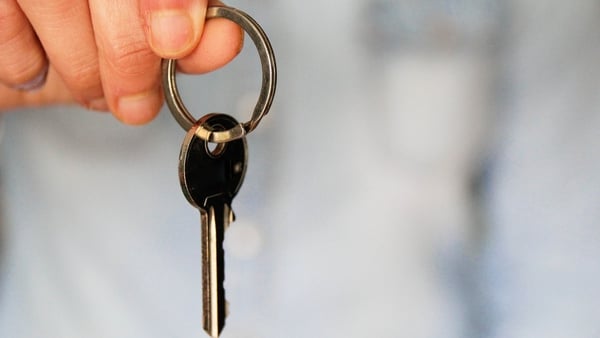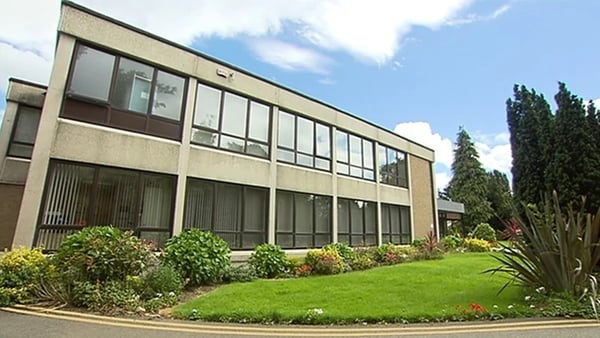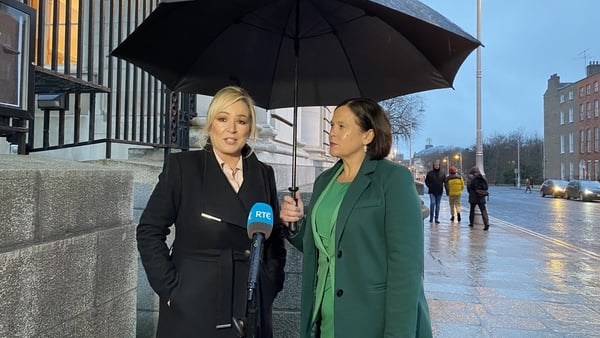The Government has announced its plans to reopen the country for Christmas by loosening travel and indoor dining restrictions, while stepping up the use of face masks.
Taoiseach Micheál Martin said there was no evidence that supported the full reopening wet pubs.
Ministers placed an emphasis on members of the public taking personal responsibility and have adopted the message that "every contact counts".
Restaurants and pubs operating as restaurants, serving a substantial meal, can reopen for indoor dining with additional restrictions from next Friday.
Diners are allowed stay for up to one hour and 45 minutes, but longer if the tables are further than two metres apart.
The move comes despite a warning from Chief Medical Officer Tony Holohan to the Minister for Health that the Covid-19 reproduction rate is likely to rise above one following the easing of restrictions.
The Government's plans have been sharply criticised by the Vintners Federation of Ireland and the Irish Hotels Federation.
Publicans said the decision not to allow wet pubs reopen was a "stunning act of Government hypocrisy".
While the hotels' lobby group described the decision not to allow inter-county travel until 18 December "as short-sighted".
Taoiseach says there will not be any further reopening of so-called "wet pubs" from 1 December, he says reopening indoor hospitality carries risks. Micheál Martin says additional supports will be made available | https://t.co/b37v48bGRI pic.twitter.com/O0Q6hdpAzQ
— RTÉ News (@rtenews) November 27, 2020
The Government’s plans mean that from 18 December until 6 January, people can travel around the country. Also from 18 December, up to three households can gather.
Mr Martin said people should stay within their counties, unless for work, education or to care for someone, until that date.
Regarding travel to Northern Ireland, the Taoiseach said the Government would be "monitoring" the effect of restrictions in the six counties.
Travel to Northern Ireland will be examined again by Government closer to 18 December.
The Taoiseach said people should also continue to work from home and that households should not mix outside of their bubbles until 18 December.
From 1 December, people are advised to wear masks in crowded workplaces, places of worship and busy outdoor areas.
Taoiseach Micheál Martin says from 1 December, people will be asked to wear face coverings outdoors on busy streets, in crowded indoor work places and in places of worship | https://t.co/b37v48bGRI pic.twitter.com/ilv8wHmmyS
— RTÉ News (@rtenews) November 27, 2020
Retail outlets, hairdressers, museums, libraries and gyms will reopen from 1 December.
People will also be able to attend religious services and attend sports training from that day when the country returns to Level 3 restrictions.
From Friday 4 December, restaurants and pubs that have a kitchen and serve food will reopen. Hotels can also reopen their dining rooms to the public from that date.
Wet pubs will only be permitted to serve takeaway drinks.
Fáilte Ireland has also drawn up guidelines to allow Santa visits take place from next week.
In his speech, Mr Martin said he understood that people were "fed up" with Covid-19, he said he often felt that way himself, but he said that all of the efforts and sacrifices that people had made were working and that lives had been saved.
He said that in making the decision to reopen restaurants that ''we are trusting business owners and their customers''.
''We all have personal individual responsibility and by closely following the rules we believe we can make this reopening sustainable,'' Mr Martin said.
He said reopening indoor hospitality causes risk and that ''there is only so far we can safely go''.
Additional supports would be made available to wet pubs, he said.
Taoiseach says this cannot and will not be the kind of Christmas we are used to. Micheál Martin says that from 1 December, the country will be moved to Level 3 with "some modifications" | https://t.co/b37v48bGRI pic.twitter.com/FjvKD3MS66
— RTÉ News (@rtenews) November 27, 2020
Read more
- Covid-19: Seven further deaths and 206 new cases
- All you need to know about the easing of Covid-19 restrictions over Christmas
- Explained: What will a Covid-19 Christmas look like?
- Face masks now advised in work and busy outdoor areas
At a briefing following the announcement, the Tánaiste said it had been a "pretty rotten" year for everyone, but that next week somewhere between 100,000 and 150,000 people will be able to return to work.
Leo Varadkar said the Employment Wage Subsidy Scheme would remain in place at the current rate until January 2021.
He said for those returning to work, the Pandemic Unemployment Payment remains in place for new entrants and re-entrants.
Mr Varadkar said if an employee loses their job or a business has to close again, employees will be able to reapply for PUP.
He said the advice to Irish people living abroad was to "put off" coming home for Christmas.
He said if they have to come home for family reasons then they should follow the rules and isolate for two weeks.
Mr Varadkar warned that tougher restrictions may have to be reimposed in the New Year.
Tánaiste Leo Varadkar: "Having to reimpose tough restrictions in the New Year is not inevitable, it is in our hands and a lot of it will depend on personal responsibility" | https://t.co/b37v48bGRI pic.twitter.com/JzgO1JAQHF
— RTÉ News (@rtenews) November 27, 2020
Mr Varadkar said he has been suffering from cabin fever and that he would be going to the gym and for a haircut on Wednesday and then to a restaurant at the weekend with friends.
He said he was delighted that people are getting back to work.
Green Party leader Eamon Ryan said collective action had brought the case numbers down again.
He said: "We are spending €1bn a month on the various supports and we'll keep doing that for as long as necessary."
At the same briefing, the Taoiseach said testing was improving and capacity was improving. Mr Martin said serial testing was being carried out in nursing homes and meat factories.
He said in the New Year, in certain settings, antigen testing would be used.
Taoiseach @MichealMartinTD hoping that some businesses may not have to close again in the new year, such as non-essential retail @rtenews pic.twitter.com/AcSVyw8KsO
— Tommy Meskill (@TommyMeskill) November 27, 2020
Rules eased despite NPHET concerns
The easing of restrictions comes despite warning from members of the National Public Health Emergency Team.
The Chief Medical Officer wrote to Minster Stephen Donnelly last night following a meeting of NPHET on Wednesday.
Dr Holohan said NPHET's view is we do not have the flexibility to enable resumption of hospitality in restaurants and bars if we are to enable an easing of the current prohibition on mixing between households
He further warned that easing restrictions and allowing inter-generational mixing during the Christmas period may result in a significant rise in infection among the most vulnerable.
Dr Holohan said they are most likely to require hospitalisation and ICU admission and in whom mortality will be highest.
He also stated the health services remain very vulnerable and warned that people may not follow public health advice to limit social activity.
However, two key sets of figures on people's mental well-being influenced the Government decision to ease the restrictions.
The CSO data showed that there was a significant increase in the number of people who are depressed or downhearted most of the time.
It rose from 2.8% in 2018 to 5.5% earlier this year.
There was also a sharp rise in the number of people who are experiencing low overall life satisfaction.
This figure rose from 8.7% in 2018 to 29.6% this year.
That is almost double what it was at the height of the financial crisis.
Additional reporting Mícheál Lehane
Read more






